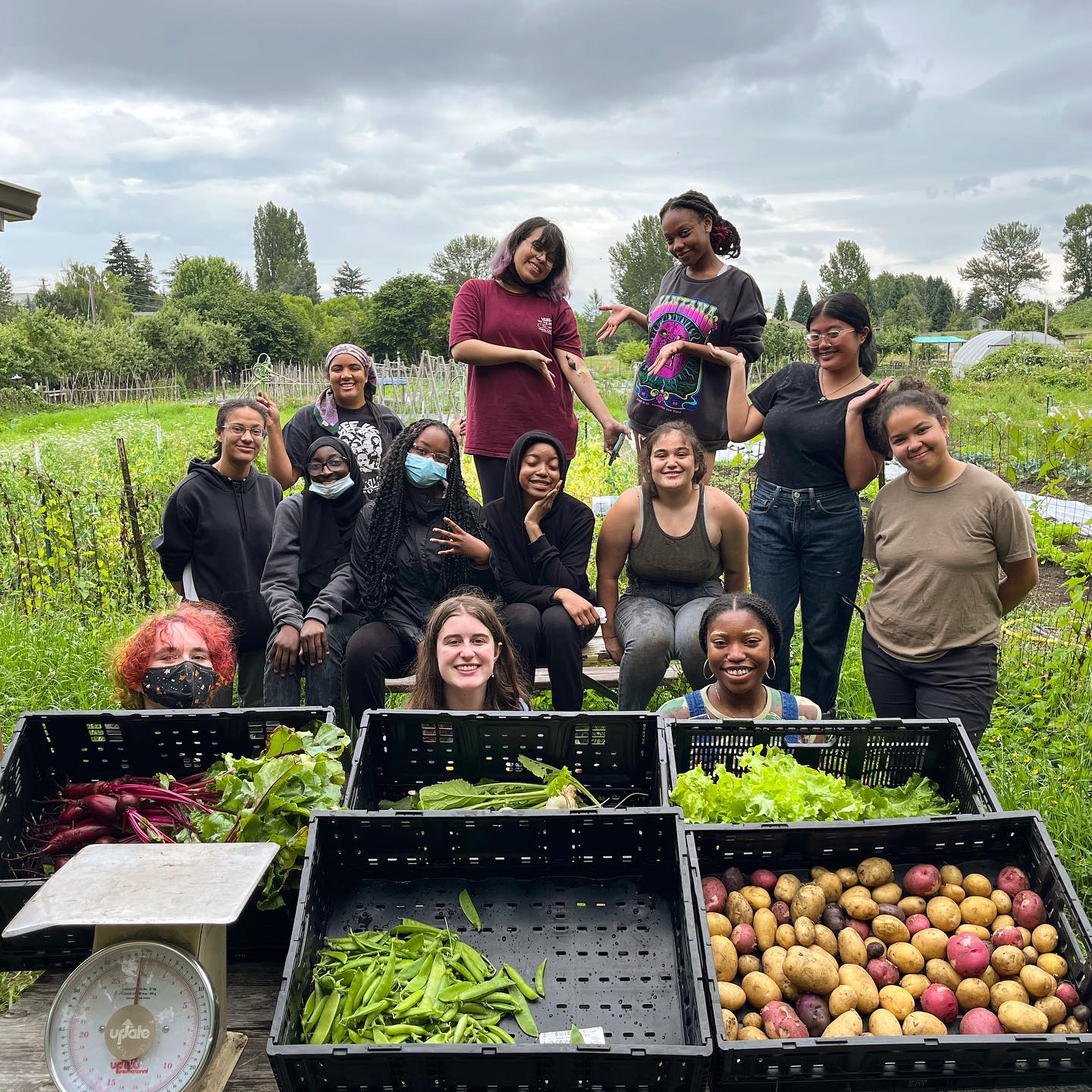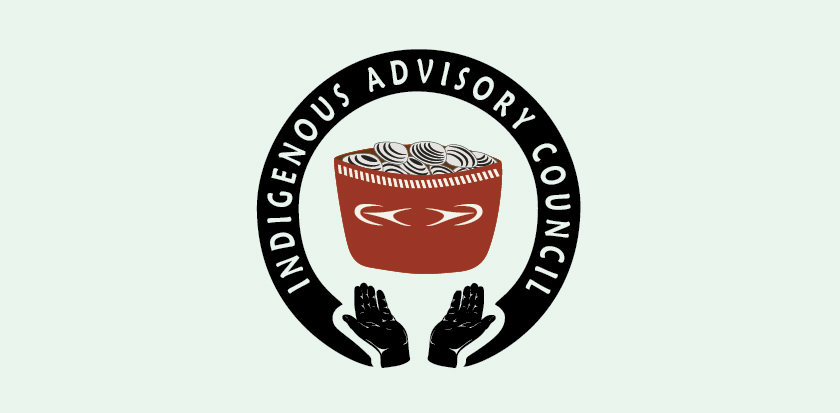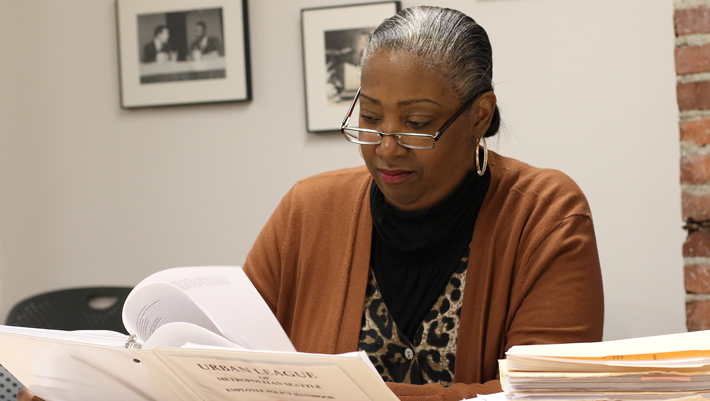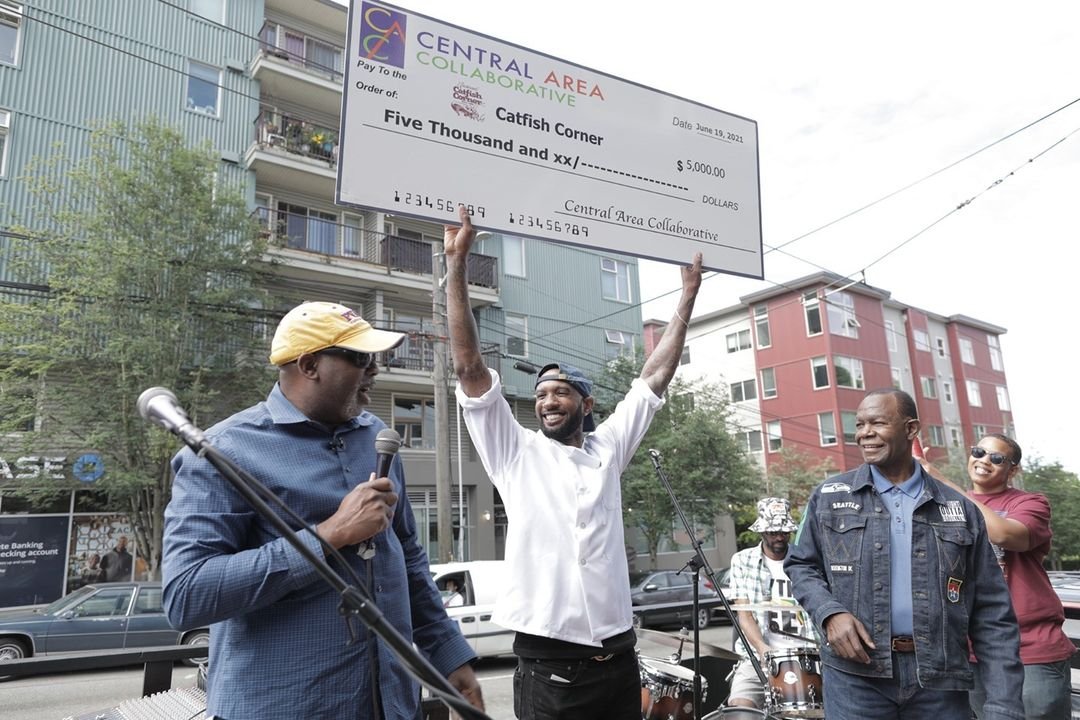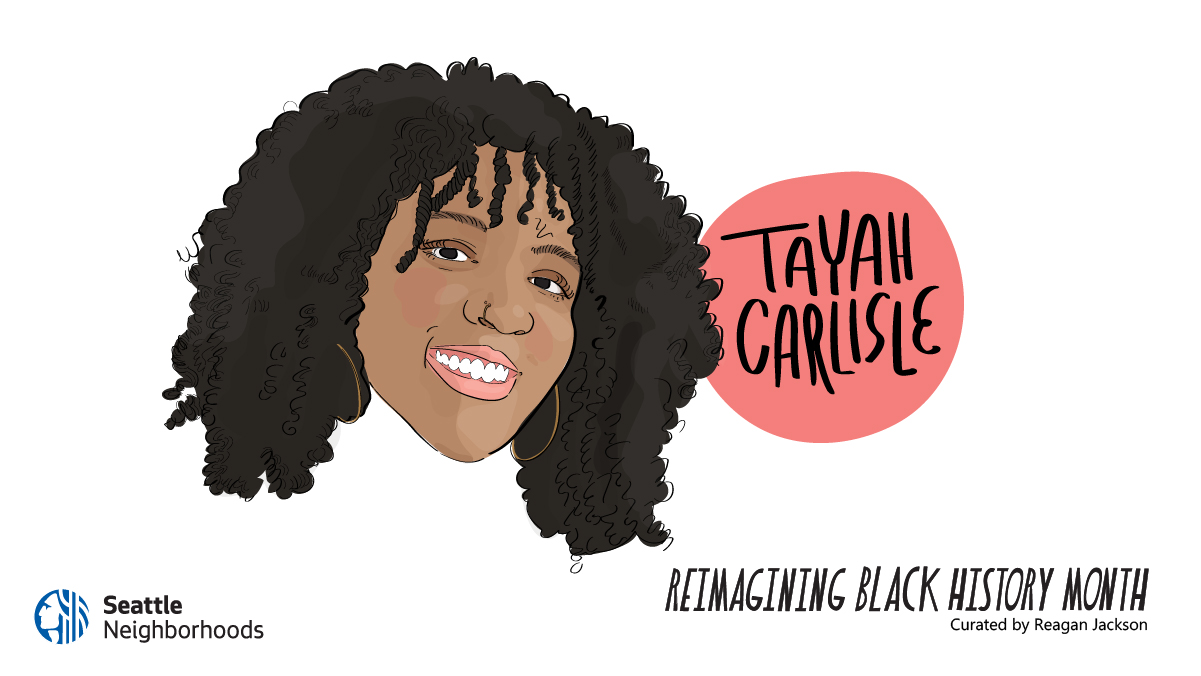
In celebration of Black History Month, we have invited community leader and activist, Reagan Jackson, to curate a series of community stories and profiles that both amplify the Black experience right now and imagine a new Black future in Seattle. Stories will be published throughout the month under #ReimaginingBlackHistoryMonth.
Tayah Carlisle is the Grow Program Coordinator at Young Women Empowered (Y-WE). Grow is a program based out of Marra Farm, that helps young people connect with the Earth in reciprocal relationship, gain practical gardening skills, and grow fresh, culturally-relevant produce. Tayah was born and raised in Seattle’s Central District and left to study Sociology and Human Services at Loyola University in Chicago. While in Chicago, Tayah’s work both off and on campus reflected her passion for working with marginalized communities while also cultivating a safe and brave space for growth and healing.
We recently checked in with Tayah to ask her to reflect on her work, her ancestors, her thoughts on Reimagining Black History Month, and her dreams for Black future in Seattle.
Tell us a little about your story.
My name is Tayah. I am 25 years old, born and raised in Seattle, specifically in the Central District. My dad is also born and raised in the Central District and my grandmother moved to the Central District from Galveston, Texas when she was five. So, I feel like the Central District is through my veins. I am the daughter of Joe Carlisle, who’s an educator. I am also the daughter of Nicole Carlisle, who is my mother. I’m half-Black, half-White.
I am a youth worker and farmer and have really found healing in working with the land. I’ve been on this path of community work my whole life. My grandmother owned a daycare, Bryant Daycare, which was in the Central District in the same house that my dad grew up in. And the same house that my grandma basically raised me in. It was like a really big community space. Once I graduated from the daycare, I went into working at the daycare. I was five years old taking care of the babies. And so, I feel like youth work has always been in my life. My dad was a teacher and a coach for CD Panthers and has been really deep in the community. I feel like he really set me up to be in community and doing this work with youth. Currently, I work at Young Women Empowered doing farm-based facilitation out of Marra Farm in South Park.
We do programming based in food justice, environmental justice, and healing and what it means for folks of color, especially marginalized folks, queer folks, and folks who identify as women or non-binary, to connect with the land and feel safe with the land. Even though we’re blessed with so many parks and waterways in Seattle, it doesn’t necessarily feel safe as a Black person, as a Black queer person in the city, even though this is where I’m from. So, we really try to offer space for that reconnection – that return back to the land.
What about your work brings you joy?
I love this question. I started working at Y-WE under the AmeriCorps program. I was just the program coordinator, coordinating our art programs that we had and not doing anything nature related. And then the pandemic hit, and we went virtual, and I, like many others was like… “What are we doing? What does safety mean? What does any of this mean? How do we care for our community?” Just big question marks. And yearning for community and a feeling of safety. And at the same time, we had this small plot at Marra Farm. It’s this beautiful place that is tucked away in South Park. And there’s this beautiful creek going through it that flows to the Duwamish River. And even just sitting next to the creek, you’re transported out of the city. You feel like you can’t hear the million planes that are flying overhead. I feel stillness and yet so much movement. It was super transformative, and I found so much healing by going there. It felt like a homecoming.
And then I think what was super transformative was during 2020, with all of the racial uprisings and Black death and Black grief, we were all looking for a place to land. We were able to be at the farm with Black youth during this very traumatizing time was super impactful and felt right, we were just being held by the land and each other. This feels so close to liberation to me, reconnecting, and finding community amongst the land. This feels right and this feels like what I want to do. We are just offering the container for our youth to show up. The land is the facilitator and to witness it brings me a lot of joy.
How has your ancestry and your lived history shaped you?
I feel like my ancestors, both out of this living realm and my living ancestors, have shaped me so much. I often think about the phrase “you are your ancestors’ wildest dreams.” I think about that a lot, especially in this shift to doing farming work. What does it mean to be a Black American doing this work?
What does it mean to be doing this work with agency, with honoring of the land and my ancestors who have been doing this work and often did it against their will, but also found so many ways of resistance in doing this work? Our ancestors resisted during enslavement by building secret greenhouses or saving seeds in different nooks and crannies of the greenhouses for their own personal gardens or making medicines and healing themselves and their community with the land.
Our ancestors found ways to learn in this unfamiliar place, to learn with one another, and to really utilize what was available. And so, we’re really trying to honor all of those stories and learn about those stories and share with the youth and also hear the stories of the youth.
I love the land and I love the farm. I feel like it offers me some spaciousness to receive, to hear what my ancestors are wanting to tell me, or to feel what they wanted me to feel. That feels powerful.
How would you like to see Black History Month reimagined?
Black History Month is every month, and I think that reframing would be cool. But I also have been really thinking about Black futures and envisioning and dreaming into the future. We don’t get space to dream. It’s hard to dream when we’re grieving. It’s hard to dream when we are trying to survive, when we’re tired, when we’re sick. Sometimes we don’t get the spaciousness to dream.
I think that this return to the land allows me to dream. It gives me time to think about what’s possible, for us to do for ourselves knowing that so much of what the agricultural system is today has been taken from Black folks and from Indigenous folks.
It’s necessary for us to dream and continue to honor our ancestors.
What are your dreams for Black future in Seattle?
I want there to BE Black futures in Seattle. I think that is first. I want there to be Black people in Seattle, you know? And I want the plentiful and abundant Black stories of Seattle to be told and shared. Not just in a way that, you know, where we’re stuck up on a wall, but their descendants are here to tell their stories too. I feel like that’s what is missing – that change happens in gentrification. There are these beautiful murals of these Black folks and Black leaders within the community but many of their descendants aren’t here to tell these stories, you know?
There are amazing Black folks in Seattle doing this work, so let’s continue to push money and resources to them. Let’s house our unhoused neighbors. Let’s be about it in a way that really centers Indigenous folks and Black folks in Seattle. I would love to be able to be in the place where I grew up and not feel sadness and grief. I would love for Black elders and children to not be harassed in their own homes and neighborhoods.
Name a local individual or organization that you want to lift up and celebrate and tell us why.
Oh my. Oh, I love this question. I want to lift up Wa Na Wari. I was doing work with amazing folks there – and just to be doing farming work in the Central District in this amazing space feels sacred and honors so much around Black creativity.
I want to uplift Yes Farm who are doing amazing work. To be doing this land-based work in such an intentional way, they’re amazing.
I want to lift up the CD Panthers… my brother and my dad. My dad was a coach, my brother played, and I was there at every practice.
Lastly, I want to lift up every Black person in Seattle! It’s a struggle just to be here and we make it every day!
